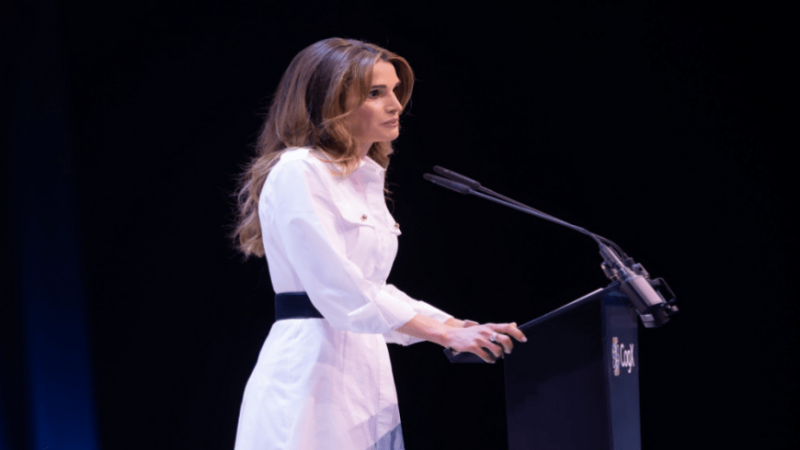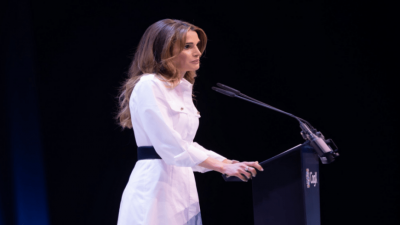Queen Rania Al Abdullah called for the humanization of decision-making in leadership to address the central question of the "CogX" Global Leadership Summit being held in London: how can we succeed in the next ten years? During her speech at the summit in front of a crowd of global leaders, technology industry experts, businesspeople, academics, and philanthropists, she stated, "We are dazzled by treatments promising eternal life, while around 14,000 children under five die every day from preventable causes... We watch executives flex their muscles while millions of the poor struggle to survive... We are amazed by rockets carrying tourists into space while our planet is burning and drowning simultaneously."
She added, "It's not surprising we feel that the world has lost its balance... as if things have deteriorated at an alarming rate. But in reality, we have made progress in many areas, as development data indicates improvements in health, education, freedoms, and poverty alleviation."
**Concept of Leadership**
Through her experience as a queen for nearly 25 years, interacting with the most influential and the most vulnerable, participating in international forums, and visiting refugee camps, she remarked, "My perspective on the concept of leadership has not only changed, but it has flipped." She explained, "I used to believe that the strongest leaders are those with firm convictions. Now, I believe that questioning and doubt are ways to test the validity and strength of our convictions. I believed that influential leaders lead from the front only; now, I believe our ability to follow others is just as important as our ability to lead. I used to think that the wisest leaders relied heavily on logic. Our strength lies in harnessing both the mind and the heart."
**Harsh Discourse**
She added, "What we see around the world in harsh public discourse is a certainty that has entrenched into a level of fanaticism... flexibility in thinking has been replaced with rigidity and obstinacy." She emphasized, "To succeed in the next ten years, we must become more accepting when we find out we were wrong."
She recalled the tragic incident in June of drowning in the Mediterranean Sea, where over 600 passengers perished while trying to reach Europe. She illustrated how each party in the dialogue about migrants viewed the sinking boat as evidence supporting its narrative, with some blaming Europe’s stringent immigration policies for the disaster, while others insisted that Europe's leniency pushed migrants to risk their lives in the first place. She continued, "When we do not accept opinions that contradict our thoughts, we resort to belittling their supporters. We barricade ourselves in trenches of 'us' against 'them', widening the divide between us... making problem-solving nearly impossible." Her Majesty called for openness, acceptance of questioning, and skepticism, pointing out that absolute certainty can lead us to fight each other instead of tackling our problems.
She asked, "Some may believe that certainty is a mark of moral integrity. But is it really?" She stated, "Certainty can lead to moral fractures – to distorted values that take a sinking ship as evidence to prove our viewpoint before considering it a humanitarian disaster."
**Displaced Persons**
She called for increased global support for host countries, such as Jordan, where one in every eight people is a Syrian refugee. She highlighted the growing needs of African countries hosting refugees from Sudan, noting that more than 4 million people have been displaced since April.
She said, "To set things right, we must do the right thing. And that requires thinking with our hearts." She used the example of King Abdullah’s decision to welcome hundreds of thousands of Syrians fleeing to Jordan after the outbreak of events in Syria in 2011.
She added, "His Majesty understood what was most important. His heart led his actions, for in his words: 'There is a hungry child and a desperate mother at our borders. How can we not let them in?'" She expressed, "I can only be prouder of the generosity shown by the men and women of my country," and praised the host countries currently receiving refugees fleeing violence in Sudan. She emphasized that neighboring countries in conflict cannot bear the responsibility of 'doing the right thing' by hosting refugees alone on behalf of everyone.
She added, "Since July, the World Food Programme has reduced support for Syrian refugees in Jordan – not due to a lack of need, but because of emerging emergency crises in new locations, while donor support has simultaneously declined." She pointed out that low- and middle-income countries host 74% of the displaced persons worldwide.
She noted the discrepancy in the global approach to refugee crises, where less than 30 percent of the appeals directed to donors have been met after four months of war in Sudan, whereas 70% of the emergency appeal to support Ukrainians was funded during the first month of its launch. Responding to this, she said, "I don’t think we need a supercomputer to explain this discrimination." She added that when individuals are demonized for seeking a better life for their families, we consider their suffering permissible. The drowning of 11 children weekly while attempting to cross the Mediterranean is seen as acceptable, and famine in a world of plenty becomes tolerable—not for lack of ability to help them, but because we consciously choose not to assist them.
Her Majesty questioned, "What is the value of artificial intelligence if we cannot muster genuine human compassion?"
**Migration**
Regarding the migration issue, she stated, "We can turn the scales to make it an opportunity, not a problem... In many developed countries, there is a surplus of jobs. One estimate suggests that by 2050, the UK and Europe will face a shortfall of 44 million workers."
She said, "To succeed in the coming ten years, we must do the right thing starting from this moment. I still believe that the way we behave as humans is what makes the difference. I still believe that our compassion for one another, our willingness to see ourselves as part of something bigger, and our awareness that we all deserve to live with dignity... all of this drives the progress we seek."
She added, "If we want to evaluate our health system, we must not overlook the care we provide to patients. To measure our resilience, we must evaluate our defense of the oppressed. To define our goal, we need to look at the marginalized among us. And to stay on track, we must ensure no one is left behind."




